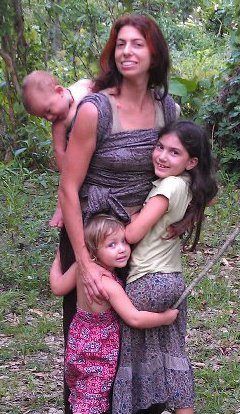Patience Isn’t Just For Babies
I have a baby, a toddler, and a seven year old. This spectrum of ages gives me some perspective that I didn’t have when my eldest was younger, and it occurs to me that these concepts compliment and build off each other:
When your baby cries, realize he or she is communicating a need. He doesn’t have words, and crying is how he tells you something is wrong.
When your toddler cries, screams, or tantrums, realize that he or she is communicating a need. Her emotions are bigger than her vocabulary and sometimes she doesn’t even know what is wrong, just that something is. Even if you don’t know what’s wrong, you can help her by being patient, calm, and loving so that she knows she is somewhere safe while experiencing scary and overwhelming emotions, and that will allow her to come back into the present moment and calm down when ready.
When your young child “misbehaves” or acts out, realize that he or she is communicating a need. His emotions are bigger than his ability to handle them gracefully, maybe because he’s hungry or tired, or under some other physical stress, because too many things have gone wrong today, or even because something has keyed him into some scary incident in his past that he doesn’t realize is affecting him. The same thing happens to me when I’m not at my prime–I react to unruly kids in ways that I resolved not to, ways that are not graceful or appropriate or helpful. I misbehave, too. You can help me at these times, and you can help your child the same way, by staying patient and calm and loving so that we know we are with someone safe until we feel safe enough to snap out of it and join you in civilized behavior. Sometimes if my husband just silently pulls me in for a long, full hug, that does the trick. You can try the same with your son or daughter. Understand that this is not his usual face, that he is stressed. The better you get at being a good listener and the less advice you offer, the less of that behavior you will see because you will have provided a safe outlet for when things are rough.
Likewise, if your baby bites you, or won’t leave the outlets alone, or pulls your hair, you know that she is learning and experimenting and it is your responsibility to keep yourself safe from her, and her safe from everything else so that she can safely explore. When she continues to do these things despite repeated reminders, you know that it is developmentally appropriate 🙂
If your toddler draws on the wall, pulls the cat’s tail, and keeps getting sticks of butter out of the fridge, unwrapping them, carrying them around in his sweaty little hand, then leaving them around the house (What? No, it’s just a random, common example), you can remind yourself that he is learning how to cause effects in his world, practicing how to do things for himself, experimenting with self-determinism and feeling the waters of interpersonal relations. It is your responsibility to set a good example and part of that good example is how to handle unplanned messes and disappointments gracefully. When he fails to stop drawing on the wall when you come in and say, “No, stop that–STOP THAT!” then you remind yourself that this, too, is developmentally appropriate. It is your job to stop him if it’s unacceptable, and it’s also your job to attempt to do it without bruising his self esteem, pride in his work, trust in you, or peace of mind. Because that’s a parent’s impossible job, and the more often we manage it, the sooner our toddlers will grow into responsible and caring children that can be trusted with markers, cats, and the contents of the refrigerator.
If your young child leaves a mess, breaks her possessions, or disobeys direct instructions, remind yourself of how far she has come, how much she has learned, and how much easier she is to live with…than when she was a toddler. Learn to take deep breaths and think before you act. Think back to this blog post when I told you that the more independence you can grant her, the better you can listen to her, the more ways you can find to accept help from her the way she wants to offer it, the more ways you can find to appreciate her, and the more you can refrain from controlling her, the sooner she will improve on all fronts and blossom into the sweet, thoughtful, responsible and trustworthy person you know she is. Every time you put more attention on what she’s doing right, instead of wrong, that’s when you will see her doing more right. And as always, it is your job to set a good example. She will show you respect when she sees you respecting her needs, objections, crises, contributions, explanations, and bright ideas. She will become responsible for her messes, possessions, and obligations as you model responsibility be behaving consistently toward her and in your dealings with others (they are always watching). Your thoughtful and caring actions towards her, will inspire her to think of how you might feel about her actions. Be honest and frank in your communication and in your love. Listen to her, and you will find her listening to you.
And most of all, remember that mothers who blog about how to mother, are subject to all the pitfalls that you are. Lucky for me, this post was about some ideals to operate from, and not about the facts of my parenting wins and fails. These are my beliefs, and when I am calm and all my children are asleep, I think about these ideas and smile peacefully. In the morning I will do my best to operate from them. I think operating with loving intention is an awfully good start.


3 Responses
Thanks for this. It’s wonderful. 🙂
I love this. We, too, are spread “thin”. In the next 2 weeks we will have one turn 23, one complete middle school, one complete elementary school, one is finishing kindergarten, one turns 1 and our grand-daughter turns a month old. I love the patience and perspective my children have allowed me to grow into…
Thank you so MUCH! This was what a need to hear today 🙂 thanx for sharing
xo